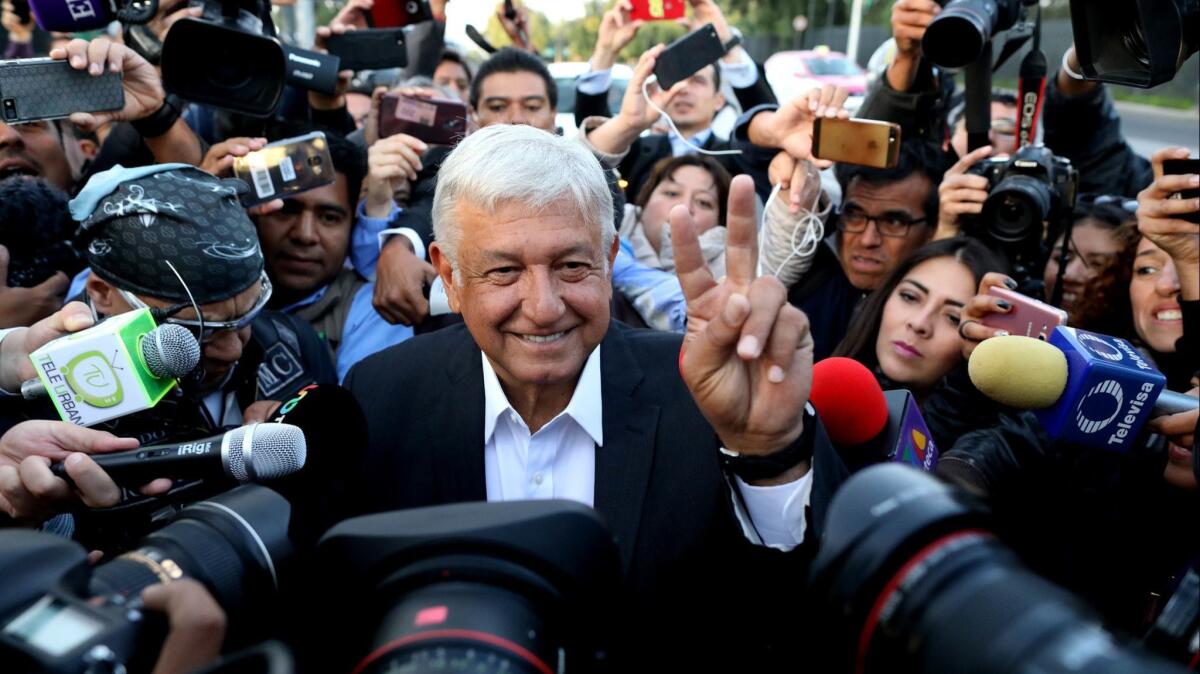Five challenges that lie ahead for Mexico’s next president

- Share via
Andres Manuel Lopez Obrador will be sworn in as Mexico’s president on Dec. 1 with an unusually strong mandate from the Mexican people, who elected him in a landslide Sunday while also delivering his young leftist political party a large number of seats in Congress.
Still, many challenges lie ahead for Lopez Obrador, whose populist campaign surged thanks to voter anger at Mexico’s rising violence and endemic corruption.
Here’s what he’ll be up against.
1. The coming ‘civil war’
Lopez Obrador, who ran and lost in 2006 and 2012, was successful this time around in part because of the diverse groups he brought in to form his winning coalition.
The coalition is made up of leftist intellectuals but also far-right evangelicals and old-time members of the long-ruling Institutional Revolutionary Party. When it comes to directing policy, which group will prevail?
His test in the coming months will be balancing competing visions while holding the coalition together.Still, many predict a civil war may be brewing among Lopez Obrador’s supporters. As Democratic political strategist James Carville once said: A campaign is time to stab your enemies. A transition is a time to stab your friends.
2. An unpredictable neighbor
Lopez Obrador has vowed to forge a relationship with the U.S. based on friendship. But what happens ifhalf of the relationship isn’t acting very friendly?
President Trump has used Mexico as a punching bag over the last several years, humiliating the nation’s president, Enrique Peña Nieto, with his repeated vows to make Mexico pay for construction of a border wall. Trump’s antagonistic attitude is unlikely to stop overnight.
Analysts say Lopez Obrador and Trump have some things in common, including large egos and a taste for populist rhetoric.
They also see eye to eye on some issues — including raising wages and labor standards in Mexico — which could lead to agreements on priorities such as NAFTA.
3. NAFTA
The renegotiation of the North American Free Trade Agreement has been bumpy since Trump initiated its overhaul last year.
Unlike Peña Nieto, Lopez Obrador has doubts about the agreement and won’t necessarily do anything to keep it.
Although Trump and Lopez Obrador both prioritize raising Mexican wages, each will ultimately be looking out for his country’s best interests. And Trump’s hostile streak could torpedo the whole thing at any time, throwing Mexico’s economy into crisis.
In an interview with Fox News on Sunday, Trump issued threats against Mexico and Canada if they don’t get on board with his plans for the agreement.
“If they're not fine, I'm going to tax their cars coming into America,” he said.
4. Promises, promises
During his campaign, Lopez Obrador promised expanded social programs for the sick and elderly and free higher education for all Mexican students. He vowed to bring peace to Mexico, to bring down gas prices and to stamp out corruption.
“I will not fail you,” he told supporters gathered in Mexico City’s historic square to hear him declare victory Sunday night.
But will Lopez Obrador be able to achieve all that he has promised?
For example, tackling corruption, a problem ingrained in nearly every aspect of Mexican civic life, will not be simple. Instead of laying out a clear plan to combat corruption, Lopez Obrador has repeatedly said that he will lead by example.
But will that be enough? And what happens if he doesn’t fulfill his promises?
5. Security
Lopez Obrador isn’t the first presidential candidate to win in part by convincing voters that he can reduce violence. But since the launch of the drug war in 2006, none have succeeded.
Last year, Mexico recorded more homicides than at any point in its modern history, and it is on track to break that record this year.
Lopez Obrador has vowed to curtail violence by stamping out its root causes: poverty and lack of opportunity. But given the endless appetite for drugs north of the border and the large flow of guns heading south, security analysts question whether anti-poverty programs will be enough.
Lopez Obrador has also floated the idea of offering amnesty to nonviolent drug war criminals, and members of his security team have proposed a truth-and-reconciliation process, like the one carried out in post-apartheid South Africa, which involves the creation of a commission tasked with exposing past wrongdoing in an effort to heal.
But those proposals are controversial. And experts say they won’t be successful unless Mexico also makes serious efforts to professionalize police and soldiers and improve its criminal justice process.
Twitter: @katelinthicum
Sign up for Essential California
The most important California stories and recommendations in your inbox every morning.
You may occasionally receive promotional content from the Los Angeles Times.








